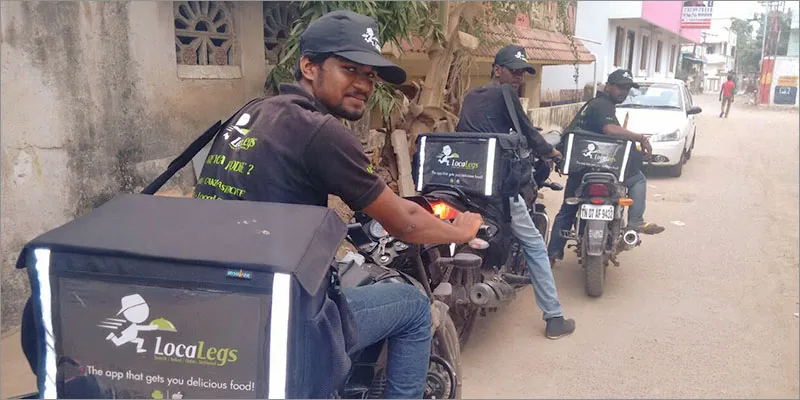From B2C to B2B: what caused Chennai-based hyperlocal startup LocaLegs to switch gears?
Hyperlocal seems to be the buzzword in the startup world. As many as 27 deals relating to hyperlocal services were announced in the first half of 2015, with an approximate investment of over USD 135 million in them. Looking at the booming demand for these services, and backed by the investments made by the capitalists, the sky seems the limit for them.
Exclusive logistics and delivery carriers seem to be the new market in which startups are forming. With ventures like Swiggy and Grofers saturating the B2C market, companies like RoadRunnr are emerging to grab the B2B segment.
Similarly, there is Chennai-based venture LocaLegs. Started in April 2015, the company focuses on the B2B home delivery space. They aim to work not just with regular brick and mortar stores, but also look forward to signing up with e-commerce players like Flipkart and Snapdeal for last mile deliveries.

The venture was founded by IIT alumni Pratik Agarwal and Vivek Poddar. Pratik is from Bilaspur (Chhattisgarh). There, he owned a carrying and forwarding (C&F) agency that undertook jobs from different cement companies. It was then that he learned about logistics, and decided to move to Chennai to build his own logistics company.
Soon, Vivek joined in too. While pursuing his masters in Canada, Vivek had a part time job delivering food to different parts of the city. During this, he realised that India’s delivery mechanism was way behind Canada’s. The idea of creating something in the hyperlocal delivery space in India then remained at the back of his mind.
However, their realisations didn’t stop there. They entered the market as a B2C brick and mortar delivery player. But they soon realised that their passion lay in enabling and improving technology for the logistics segment. Vivek tells us:
“We thought that the B2C hyperlocal market was getting saturated. There are as many as seven ventures today operating in the segment. Moreover, we wanted to work towards better enablement of technology and services in the delivery space, rather than being a part of the discount-and-coupon model used as techniques to attract more customers.”
The co-founder adds that as many as 90 per cent of hyperlocal companies need enablers for technology.
Currently bootstrapped, LocaLegs was angel-invested by three individuals, who continue to advise and mentor the startup with activities revolving around business development and customer relationship strategies.
At present, this seven team venture has an active running network of 35 delivery boys in Chennai.
Future prospects

Moving forward, the venture plans to expand their operations to Mumbai by the end of this year. They are also looking at widening their presence in cities like Ahmedabad and Jaipur, which fall between Tier I and Tier II.
The company is looking at changing their business strategy with a repositioning in their marketing approach. They plan to focus on verticals like pharma, grocery, and e-commerce.
The co-founder says that the venture might undergo some fixed expense losses (invested on their website and mobile application, owing to the change in strategy). However, they remain optimistic on overcoming them through implementing a better business sales plan.
There are plans to introduce certain developments on the technology front like a real-time tracking system. This would track the locations of the delivery boys and give the startup some insight into their behaviour.
Vivek tells us that if a delivery boy stays in a place for too long, or deviates from his route, the system sends an alert. It also informs if the charge on the delivery boy’s phone is too low. Furthermore, LocaLegs is using the analytic information generated by this technology for better optimisation of resources around certain areas.
The venture is in talks with Jungle Ventures and Smile group, as they are looking for a lead investor in the market.
Growth & challenges

When discussing revenues, the co-founder tells us that the average ticket size (per delivery) is Rs 500. With as many as 200 deliveries made on an average, revenue accumulates to Rs 1,00,000 every day. The venture further claims that their revenues are growing at 76 per cent every week.
Looking forward to doubling their revenues every quarter, Vivek states the firm’s delivery rate was 60 per day in May, 130 per day in June and is now around 300 per day. LocaLegs intends to take this to 10,000 deliveries per day by the end of the year.
Although they are faring well on the revenue front, the road to success is still not smooth and straight for the startup. Their biggest resource continues to be their biggest challenge. Vivek concludes:
“The attrition rate of delivery staff is nearly 60-70 per cent. They come one day and leave the next. We have interviewed almost 150 of them, while only 40 have joined us. Moreover, getting their backgrounds checked and providing them with the necessary training can be a challenge. Also, competitors are raising the salary bracket for these individuals every day, forcing us to do the same in order to retain the staff.”
LocaLegs is in discussions with a few NGOs, and plans to hire individuals supported by these, thus giving them better employment opportunities.







